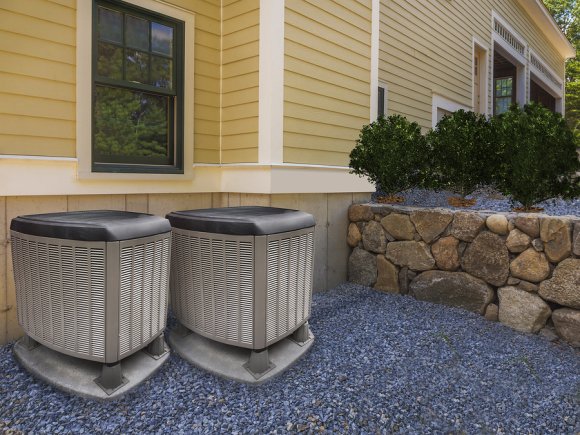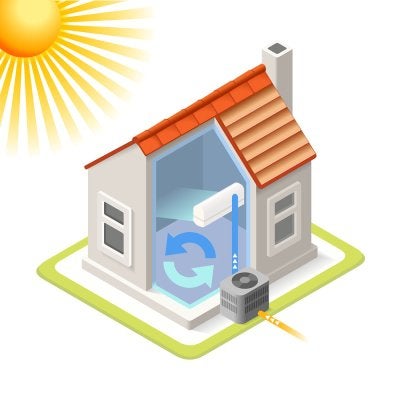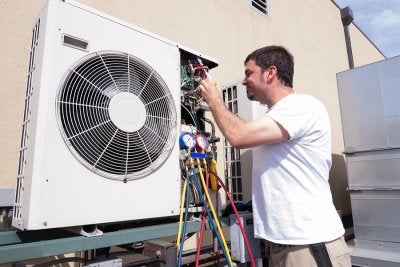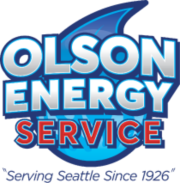-
The Benefits of a New Air Conditioner
The function and efficiency of your home’s HVAC unit can significantly affect your family’s comfort, as well as the cost of your monthly energy bill. If you’re not completely satisfied with your AC’s performance, then you may benefit from investing in a new air conditioner serving Seattle.
New air conditioners can increase the comfort that you enjoy while indoors by cooling properly and contributing to ideal humidity levels. Also, the technology used in newer units can improve your home’s energy efficiency, even if your current AC hasn’t reached the end of its 10 to 15-year lifespan.
Some homeowners hesitate to invest in a new air conditioner when they aren’t sure how long they will be staying in their home. If you move, it’s true that you won’t be around to enjoy your long-term return on investment, but you will benefit from the increased value that it provides for your property. Additionally, you will be able to take advantage of better AC performance for the time that you remain in your home.

-
When to Replace Your Furnace?
Have your energy bills increased and you can’t figure out why? If so, then it may be time to look for a replacement furnace in Seattle. Just like heat pumps and air conditioners, furnaces lose their efficiency as they near the end of their lifespan. Watch this video to learn more about furnace service and when to replace your furnace .
Another sign that you may need a new unit is if you’re frequently scheduling furnace repair appointments. A furnace repair that breaks down regularly despite expert maintenance services could be on its last legs. Also, if you’re often adjusting your thermostat or if your home never gets as warm as you would like, then it’s probably time to start looking for a new furnace.
““
-
Taking Good Care of Your Air Conditioner
For many people, having a well-functioning AC unit is essential for staying comfortable during the summer months. If you want to get a long life and the maximum efficiency from the air conditioning unit in your Seattle home, regular upkeep is a must. Here, you’ll find several tips to help you keep your air conditioner in good shape:
Pay attention to the filter.
 Your AC’s filter plays an important role in improving your indoor air quality and helping the unit run efficiently. The air filter is housed at the air intake and is responsible for trapping particles from the air as they’re drawn into the air conditioner. By trapping these airborne particles, the filter ensures that there will be less of them floating around your home and settling on your furniture. Air filters can be either reusable, which require cleaning, or disposable, which should regularly be replaced. You should clean or replace your filter at least once per month for optimum efficiency and to help keep your indoor air clean.
Your AC’s filter plays an important role in improving your indoor air quality and helping the unit run efficiently. The air filter is housed at the air intake and is responsible for trapping particles from the air as they’re drawn into the air conditioner. By trapping these airborne particles, the filter ensures that there will be less of them floating around your home and settling on your furniture. Air filters can be either reusable, which require cleaning, or disposable, which should regularly be replaced. You should clean or replace your filter at least once per month for optimum efficiency and to help keep your indoor air clean.Clean the area around your air conditioner.
Minimizing the amount of debris around your air conditioner can help it run better and require less frequent cleanings. Regularly remove fallen leaves and similar items that accumulate near the condenser unit, and trim back any foliage that may be hindering air flow.
Schedule regular maintenance.
When it comes to repairs and more in-depth maintenance, it’s a good idea to hire a professional. When you schedule a tune-up appointment with an HVAC technician, he will perform several steps to help keep your air conditioner working well. He should ensure that the unit has sufficient refrigerant and test for leaks, measure how much air is flowing through the evaporator coil, and check the duct system for holes. You can also expect him to make sure that the thermostat is functioning properly, inspect electrical terminals, and tighten and clean connections. You should schedule professional air conditioner maintenance at least once per year to take good care of your unit.
““
-
How Do Heat Pumps Work?
For many people, the first thing that comes to mind when they need to lower the temperature in their home is to turn on the AC. Many households use air conditioners to stay cool during the summer, but heat pumps near Seattle can provide the same effect while using less energy.
Heat pumps are energy-efficient heating and cooling units.
 Because of their name, the average person wouldn’t expect a heat pump to have anything to do with cooling. These units can have the dual purpose of heating your home in the winter, and keeping it cool during the summer. Heat pumps are units that use a small amount of energy to move heat to a different location. These devices are ideal for use in climates that enjoy moderate temperatures without hot or cold extremes. When installed in less temperate zones, supplemental heating or air conditioning may be necessary.
Because of their name, the average person wouldn’t expect a heat pump to have anything to do with cooling. These units can have the dual purpose of heating your home in the winter, and keeping it cool during the summer. Heat pumps are units that use a small amount of energy to move heat to a different location. These devices are ideal for use in climates that enjoy moderate temperatures without hot or cold extremes. When installed in less temperate zones, supplemental heating or air conditioning may be necessary.Heat pumps rely on heat transfer to warm or cool your home.
A heat pump’s purpose is to pull heat from the air or the ground, and then move it to another location. These units use mechanical-compression style refrigeration and typically consist of two components. The indoor part, which is called the air handler, contains the blower, which moves air into your home. The outside section, which is the heat pump, resembles an air conditioning unit and is responsible for heat transfer. Heat pumps come in a variety of styles, but their basic principle for operation is heat transfer. In the case of cooling your home, the machine works by pulling warmth from inside the home and moving it outside.
Heat pumps may offer you several advantages.
Heat pumps are single unit devices that are used for both heating and cooling, often making them more convenient to install than an HVAC system. Also, because they run on electricity and do not require fuel to heat or cool a space, they are energy-efficient and can save you significantly energy costs.
-
The Olson Energy Service Story
Olson Energy Service specializes in electrical, water heater, air conditioner, air duct cleaning, boiler, heat pump, and furnace services in Seattle. Family-owned and operated, Olson Energy Service has provided the Greater Seattle Area with decades of first-rate, experienced, and reliable service.
Founded by Garnett Olson in 1926, Olson Energy Service began as Olson Fuel Company, which sold coal and firewood to homes and businesses. By the 1930s, heating fuel preferences shifted towards oil, and the company expanded to include this service. Generations of Olsons have worked for Olson Fuel Company, which became Olson Energy Service in the early 1990s as its range of services grew.
Today, Olson Energy Service boasts numerous affiliations and awards and is among the premier HVAC contractors for Seattle. Our experienced staff continues to provide exceptional, professional, and quality service throughout the Greater Seattle Area and looks forward to helping you with your heating and cooling needs.
““
-
What is a Mini-Split Air Conditioner?
Are you considering your different options for air conditioning near Seattle? Mini-split systems offer heating and cooling solutions for areas that lack central air conditioners or heating systems.
Design
Mini-split air conditioners are ductless units that are used to cool a room or area of a building. These units are similar to central systems in that they have both an indoor and outdoor component. Mini-splits consist of an outdoor condenser/compressor and an indoor air-handling unit.
Uses
 While there are numerous potential applications for these air conditioners, most often they are installed as retrofit add-ons for buildings that lack a ducted heating system. Examples can include homes that are heated using radiant panels, space heaters, or hot water heat. Mini-split air conditioners are also an excellent cooling solution for small apartments and room additions where it may not be feasible to install ductwork.
While there are numerous potential applications for these air conditioners, most often they are installed as retrofit add-ons for buildings that lack a ducted heating system. Examples can include homes that are heated using radiant panels, space heaters, or hot water heat. Mini-split air conditioners are also an excellent cooling solution for small apartments and room additions where it may not be feasible to install ductwork.Advantages
Due to their small size and the flexibility of their installation, mini-split air conditioners can be used to cool a single area or room. Additionally, many models can have up to 4 indoor handling units connected to a single outdoor condenser/compressor. Because each indoor unit has an individual thermostat, you can save money by cooling only the areas that you wish. Mini-splits also tend to be easier to install than other cooling systems. Most styles require only a 3-inch-wide hole through the wall to connect the indoor and outdoor components, and your indoor air-handling units can be as far as 50 feet from the outdoor apparatus. This allows home and business owners to install the outside section in an inconspicuous place, if necessary.
Disadvantages
The primary drawback that you will face if you opt for a mini-split air conditioner is the cost. These systems will require more investment per ton of cooling capacity when compared to central units, assuming there is already ductwork present, and can cost significantly more than a window cooling unit. Additionally, mini-splits can be more conspicuous than central air vents, but they are generally less obtrusive than window air conditioners.
““
-
Get the Most Out of Your Air Conditioner
A lack of proper maintenance is the primary reason that HVAC units fail. If your air conditioning near Seattle hasn’t been inspected for over a year, it may not be functioning at maximum efficiency. Watch this video for tips on getting the most out of your air conditioner.
If your A/C sounds noisy, keeps turning on and off, or seems to be running all day, then you may benefit by scheduling air conditioner maintenance. Also, a rise in the cost of your monthly energy bill or a higher humidity level in your home are both indicators that the unit may be functioning poorly and can benefit from a tune-up. Your air conditioner loses an estimated 5% of its efficiency each year that it isn’t inspected and cleaned.
-
Choosing the Right Size Air Conditioner
If you’re in the market for a new air conditioner and live in the Seattle area, selecting the right sized unit for your space is essential. When an HVAC unit’s cooling capacity is too small, it will fail to keep your home at a comfortable temperature. When your A/C is too big for your home, it will use more electricity than is necessary and will make your home’s interior unpleasantly humid. Figuring out the right size air conditioner for your needs is vital for maximizing the unit’s efficiency and performance.
Measure your home’s square footage.
 Determining the size air conditioner that you need will require some measurements and a bit of math. First, measure the square footage of each of the rooms that you intend to cool. Use a tape measure to learn the length and width of one room, and write these measurements down. Next, multiply these two numbers to figure out the square footage. Complete this process for each room of the house, writing down the measurements and totals as you work. Be sure to include only areas that your central ducts reach, excluding basements, garages, and attics.
Determining the size air conditioner that you need will require some measurements and a bit of math. First, measure the square footage of each of the rooms that you intend to cool. Use a tape measure to learn the length and width of one room, and write these measurements down. Next, multiply these two numbers to figure out the square footage. Complete this process for each room of the house, writing down the measurements and totals as you work. Be sure to include only areas that your central ducts reach, excluding basements, garages, and attics.Determine your cooling capacity needs.
The next step toward finding out what size air conditioner you need is to use your measurements to determine the cooling capacity required for your home. The cooling capacity of central air systems and room air conditioners is measured using British Thermal Units (BTUs) per hour. The United States Department of Energy’s Energy Star website provides guidelines for determining the BTUs needed for your home or room’s square footage .
Consider your home’s additional factors.
Choosing the right size air conditioner can depend on a few things besides your home’s square footage. If your house receives significant sunlight or has many windows, it may need more cooling capacity than one that is shaded or allows less sunlight into the interior. Your home’s insulation will also contribute to its need for cooling capacity. Experts recommend having multiple HVAC contractors perform an estimate on your home before you make a decision about purchasing your new air conditioner.
-
Easy Ways to Boost Your Air Conditioner Efficiency
Many people are looking to save on their energy bills by making their air conditioning near Seattle as efficient as possible. Fortunately, there are a few things you can do to promote the efficiency of your air conditioner. Read on to learn about some easy ways to help your HVAC system save energy .
Inspect Your Air Filters
A clogged filter can make your air conditioning system work on overdrive. Thus, it’s important to check and replace your filters regularly to increase the lifespan of your HVAC system, cut costs on your energy bills, and reduce the amount of dust and allergens circulating through your home. Check your filters monthly and consider calling an HVAC professional if you need help replacing them.
Consider the Location of Your Unit and Thermostat
 In order to keep your air conditioning unit working efficiently, avoid installing your unit and thermostat in an area that gets a lot of sun. Placing your unit in a shaded location will make cooling the surrounding air easier. In addition, keep your unit’s thermostat away from heat-producing objects, such as lamps, television sets, computers, and other electronics. Your air conditioner will run longer than it needs to if it senses these nearby sources of heat.
In order to keep your air conditioning unit working efficiently, avoid installing your unit and thermostat in an area that gets a lot of sun. Placing your unit in a shaded location will make cooling the surrounding air easier. In addition, keep your unit’s thermostat away from heat-producing objects, such as lamps, television sets, computers, and other electronics. Your air conditioner will run longer than it needs to if it senses these nearby sources of heat.Adjust the Dial
Keep the thermostat at 78 degrees or higher to significantly reduce your energy consumption. It’s especially important to turn the dial before you leave the house so that your air conditioning unit won’t be running while your home is unoccupied. If you frequently forget to adjust the temperature before heading out, you might want to consider installing a programmable “smart thermostat” or timer so that this important task is completed automatically.
Weatherize Your Home
Prevent cool air from leaking out of your home by caulking and weather-stripping problem areas. You may also want to insulate your air conditioning ducts to prevent energy losses if they run through unconditioned areas such as your attic or crawlspace. Finally, applying window film to your windows can also help reduce the energy required to maintain a cool temperature in your home.
-
Highlighting the Advantages of Heat Pumps
Are you considering installing a heat pump near Seattle ? A heat pump can help keep your home at a comfortable temperature all year round by warming your house in the winter and cooling it in the summer. Plus, heat pumps require less energy than other types of heating and cooling systems, meaning a heat pump can help you cut down on your energy expenses.
Heat pumps work through the use of a compressor to move heat from one area to another. In the winter, a heat pump takes heat from the outside air and pumps it into your home. In the summer, it acts as an air conditioning system by reversing this cycle.
In addition to their versatility, heat pumps have numerous other advantages. First of all, they are easier to maintain and have a longer lifespan than conventional heating and cooling systems. In addition, they transfer heat rather than generate it, reducing your energy consumption and thus your carbon footprint. Finally, heat pumps also act as dehumidifiers, making your home more comfortable in the summer without increasing your electricity bills.

RECENT POSTS
categories
- Uncategorized
- Air Conditioner
- Fireplace Inserts
- Fireplace Insert Installation
- Air Conditioning Installations
- Air Conditioning Units
- Air Conditioner Maintenance
- HVAC Professionals
- Heat Pump Installation
- Heating and Cooling
- HVAC Unit
- Heat Pumps
- Furnace
- Furnace Service
- Tankless Water Heaters
- Water Heaters
- Energy Efficiency
- HVAC Contractors
- Olson Energy Service
- Mini-Split Systems
- Ductless Air Conditioner
- Residential Services
- Seasonal Boiler Maintenance
- HVAC Maintainance
